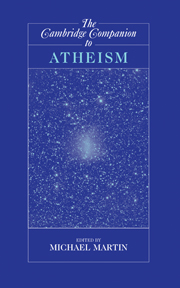Book contents
- Frontmatter
- General Introduction
- Part I Background
- Part II The Case against Theism
- Part III Implications
- 13 Atheism and Religion
- 14 Feminism and Atheism
- 15 Atheism and the Freedom of Religion
- 16 Atheism, A/theology, and the Postmodern Condition
- 17 Anthropological Theories of Religion
- 18 Atheists: A Psychological Profile
- Index
- Series List
13 - Atheism and Religion
from Part III - Implications
Published online by Cambridge University Press: 28 January 2007
- Frontmatter
- General Introduction
- Part I Background
- Part II The Case against Theism
- Part III Implications
- 13 Atheism and Religion
- 14 Feminism and Atheism
- 15 Atheism and the Freedom of Religion
- 16 Atheism, A/theology, and the Postmodern Condition
- 17 Anthropological Theories of Religion
- 18 Atheists: A Psychological Profile
- Index
- Series List
Summary
What is the relationship between religion and atheism? Is atheism itself a religion? Can there be atheistic religions? Is atheism necessarily an antireligious position?
In this chapter I argue that atheism itself is not a religion. However, I maintain that three world religions - Jainism, Buddhism, and Confucianism - are atheistic in one of the primary senses of that term as defined in the general introduction to this volume: the denial that a theistic God exists. I also show that in an important sense atheism does not even stand in opposition to theistic religions.
THE CONCEPT OF A RELIGION
The concept of religion was developed historically in the Judeo-Christian context and still has its clearest application in this context. Just as the concept of atheism applied outside its original historical context can be misleading, so too can the concept of religion applied outside its original context. Nevertheless, it will be assumed here that cautious application outside its clearest historical context can be also illuminating at least to Western readers. To answer the separate questions of whether atheism is a religion, and whether there are atheistic religions a prior question must be considered: What does it mean to say that something is a religion? It is impossible here to discuss the many attempts to define religion in philosophy, religious studies, and social science. Since my training and background is philosophical, I consider two of the best recent analyses of the concept of religion to be found in the philosophical literature.
- Type
- Chapter
- Information
- The Cambridge Companion to Atheism , pp. 217 - 232Publisher: Cambridge University PressPrint publication year: 2006
- 7
- Cited by

